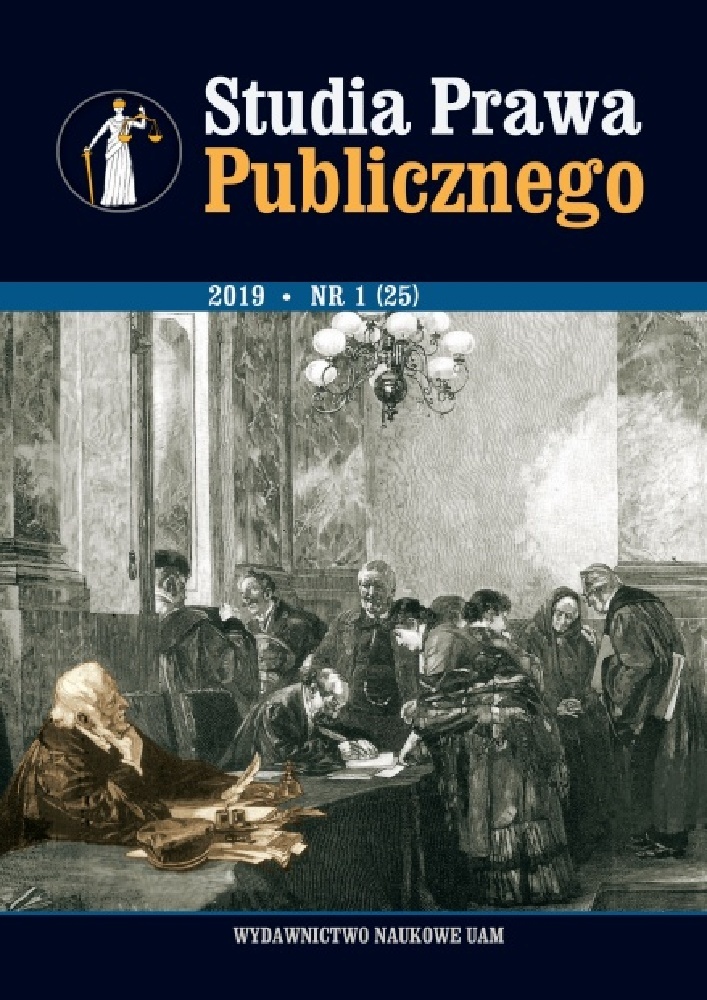Abstract
The stabilising function is one of the main intended functions of the concordats. It consists in striving to ensure the immutability (stability) of legal norms resulting from the provisions of this type of treaties, and consequently to ensure the relative immutability of legal (and factual) states created or shaped under the concordat government. The Concordat petrifies a model of relations between the state and the Catholic Church. In fact, it protects a certain system of social, political and, to some extent, economic relations. This function in the Polish legal system is guaranteed in particular by the provisions of the Constitution of the Republic of Poland of 1997 (Article 25(3) and (5)) and the provisions of the 1969 Vienna Convention on the Law of Treaties. The Concordat of 1993 is therefore legally difficult to denounce. The Treaty provides a differentiated implementation of the stabilising function. Individual norms of this act, to varying degrees, implement its stabilising function. It seems that it is most fully implemented through detailed standards of an absolutely binding nature. The second category of concordat norms from the point of view of the implementation of the stabilising function should include norms whose implementation depends on a later agreement between the Church and the relevant state authorities. As a third category, one should mention regulations which, when formulating legal norms, refer to canon law or state law. The last group consists of norms, the implementation of which depends, in fact, on a unilateral decision of the state authorities. The degree to which a stabilising function is carried out by the provisions of the Concordat also depends on the level of detail. The Concordat of 1993 is not a full concordat and therefore provides limited stability in the financial and property affairs of the Catholic Church and clergy. In practice, however, the 1993 Treaty, combined with the political strength of the Church, has ensured relatively good legal stability for the Church, although it has not yet been fully implemented and has seen some obvious violations. In many aspects, however, there has been an improvement in the legal position of the Church.
References
Borecki P., Geneza modelu stosunków Państwo-Kościół w Konstytucji RP, Warszawa 2008.
Borecki P., Opinia prawna w sprawie wybranych aspektów ustroju hierarchicznego Kościoła katolickiego oraz statusu duchownych w świetle kodeksu prawa kanonicznego, „Przegląd Prawa Wyznaniowego”, t. 7, 2015.
Encykliki Ojca Świętego Jana Pawła II, Kraków 2000.
Góralski W., Gwarancje złożone państwu polskiemu przez Kościół Katolicki w konkordacie z 1993 r., w: Prawo wyznaniowe w Polsce (1989-2009). Analizy-dyskusje-postulaty, red. D. Walencik, Katowice – Bielsko-Biała 2009.
Góralski W., Konkordat, w: Leksykon prawa wyznaniowego. 100 podstawowych pojęć, pod red. A. Mezglewskiego, Warszawa 2014.
Góralski W., Pieńdyk A., Zasada niezależności i autonomii państwa i Kościoła w Konkordacie polskim z 1993 roku, Warszawa 2000.
Górowska B., Bilateralność konkordatu. Casus umowy polskiej z 1993 r., w: Bilateralizm w stosunkach państwowo-kościelnych, pod red. M. Bieleckiego, Lublin 2011.
Górowska B., Rydlewski G., Regulacje prawne stosunków wyznaniowych w Polsce, Warszawa 1992.
Katechizm Kościoła Katolickiego, Poznań 1994.
Konstytucja Rzeczypospolitej Polskiej. Komentarz. II, pod red. nauk. L. Garlickiego, Warszawa 2001.
Konstytucja Rzeczypospolitej Polskiej. Komentarz. I, pod red. L. Garlickiego, M. Zubika, Warszawa 2016.
Konwencja o Ochronie Praw Człowieka i Podstawowych Wolności. Tom I. Komentarz do artykułów 1 – 18, pod red. L. Garlickiego, Warszawa 2010.
Krukowski J. ,Funkcja stabilizacyjna Konkordatu między Stolicą Apostolską a Rzecząpospolitą Polska z 1993 roku w procesie normalizacji stosunków państwo-Kościół, „Politeja”, 2014, nr 3 (29).
Krukowski J., Kościelne prawo publiczne. Prawo konkordatowe, Lublin 2013,
Krukowski, Realizacja Konkordatu z 1993 r. w polskim porządku prawnym, w: Konkordat polski w 10 lat po ratyfikacji, pod red. J. Wroceńskiego, H. Pietrzak, Warszawa 2008.
Krukowski J., Stabilizacyjna rola konkordatu z 1993 r. w stosunkach między państwem a Kościołem Katolickim i innymi związkami wyznaniowymi, w: Prawo wyznaniowe w Polsce (1989-2009). Analizy-dyskusje-postulaty, red. D. Walencik, Katowice – Bielsko-Biała 2009.
Prawo małżeńskie Kościołów chrześcijańskich w Polsce a forma wyznaniowa zawarcia małżeństwa cywilnego, red. T.J. Zieliński, M. Hucał, Warszawa 2016.
Walencik D., Formalnoprawne uwarunkowania stanowienia regulacji prawnych dotyczących finansowania związków wyznaniowych w Rzeczypospolitej Polskiej, w: Finansowanie Kościołów i innych związków wyznaniowych, pod red. P. Sobczyk, K. Warchałowskiego, Warszawa 2013.
Walencik D., Nowelizacja ustawy o stosunku państwa do Kościoła katolickiego w kontekście zasady bilateralności, „Forum Prawnicze” 2011, nr 2.
Walencik D., Wydatkowanie środków z Funduszu Kościelnego w latach 1951-2016, w: Kwestie majątkowe w prawie wyznaniowym, pod red. M. Bieleckiego, Lublin 2018.
Winczorek P., Komentarz do Konstytucji Rzeczypospolitej Polskiej z dnia 2 kwietnia 1997 roku, wyd. 2, rozszerz., Warszawa 2008.
Winiarczyk-Kossakowska M., Ustawy III Rzeczypospolitej o stosunku Państwa do Kościołów chrześcijańskich, Warszawa 2004.
Zasięg podmiotowy Konwencji wiedeńskiej o prawie traktatów, w: 40 lat minęło – praktyka i perspektywy Konwencji Wiedeńskiej o prawie traktatów, pod red. Z. Galickiego, T. Kamińskiego, K. Myszony-Kostrzewa, Warszawa 2009.
License
Copyright (c) 2019 Paweł Borecki

This work is licensed under a Creative Commons Attribution-NonCommercial-NoDerivatives 4.0 International License.

